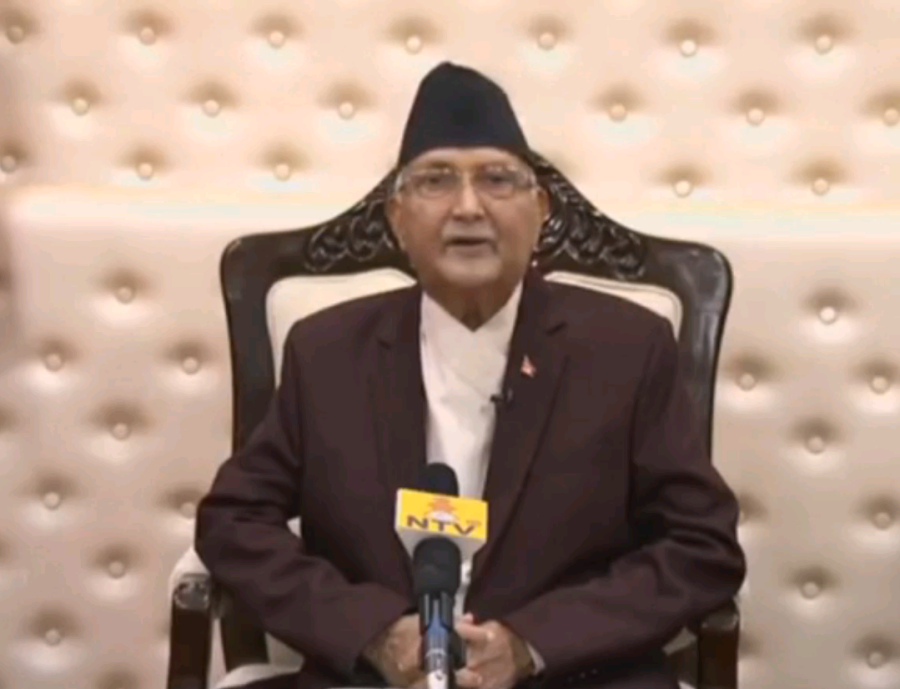National
Oli announces suspension of all flights, all long-haul transport and all non-essential services
The prime minister, in a televised address, announced these measures to control the spread of Covid-19 into Nepal.
Tika R Pradhan
The government on Friday evening announced more measures aimed at keeping the global Covid-19 outbreak at bay, including temporary bans on all flights, all long haul transportation across the country, and all non-essential services.
Prime Minister KP Sharma Oli announced these measures and more in his first address to the nation since he underwent a second kidney transplant.
Oli announced a halt to all flights from March 22 to March 31, a decision that follows Wednesday’s move by the High-Level Coordination Committee to halt all incoming passengers from 55 countries in Europe, the UK, the Gulf countries, West Asia, and Turkey. Flights from China, Bhutan, Thailand and Singapore, which were exempted from Wednesday’s decision, have now also been proscribed.
The High-Level Coordination Committee, led by Deputy Prime Minister and Defence Minister Ishwar Pokhrel took a slew of decisions on Wednesday, including the ban on passengers, postponement of the nation-wide Secondary Education Examinations, and a ban on all gatherings of more than 25 people.
Wednesday’s announcement regarding a halt to all international arrivals, including Nepalis, had created much confusion among Nepalis who are currently abroad on temporary visas. Many wanted to know how the government expected them to remain in foreign lands for extended periods without a visa extension or adequate funds.
Oli addressed this issue during his speech, urging Nepalis abroad to exercise patience and reach out to Nepali missions in the respective countries.
“It has come to my notice that many of you who are currently abroad are facing problems when it comes to returning home,” said Oli. “Exercise patience and reach out to our embassies. Our missions will assist you.”
Oli also announced a halt to all non-essential services from March 22 to April 3. As per the Nepal Gazette, published on October 14 last year, the government has enlisted 19 services as “essential”. These essential services include telephone; transportation; civil aviation; airport; mint or governmental press; defence affairs relating to arms, ammunition or production of any military goods; communication; internal security; drinking water; residence of tourists; petroleum products; health; medicines; bank; insurance; and electricity. Besides these, all other services will need to remain closed until April 3.
According to Oli, these proscriptions will be continued or discontinued depending on how things evolve.
Oli’s address did create confusion among some, especially regarding a specific provision concerning civil servants. Former chief secretary Bimal Koirala said that there were two conflicting sentences in the prime minister’s address, which say that civil servants should continue their work but also that all non-essential services will be suspended.
Oli said the private sector will be encouraged to work digitally as far as possible.
“But all civil servants and those working for essential services in the private sector will continue their regular works by coming to their respective offices,” he said.
According to General Administration Minister Hridayesh Tripathi, the government only wants to stop the spread of the virus; it does not want to halt all services.
“The aim is to ensure that the general public is not affected by the virus,” General Administration Minister Hridayesh Tripathi told the Post. “Civil servants will be doing their duties.”
At a time when many have bemoaned the lack of stringent plans and have questioned the government’s half-measures to a global crisis, the measures announced by the prime minister are likely to go some way towards alleviating concerns.
“This might invite some difficulty in daily life and affect our regular routine,” said Oli. “But to defeat potential infections, we don’t have any other option.”
The prime minister has urged everyone to avoid crowds, pay extra attention to personal hygiene, including washing hands with soap and water, stay at home as much as possible, not hoard daily essentials, steer clear of rumours, and only listen to doctors and experts.
“Exercise precautions but don’t panic,” said Oli.
The prime minister also said the Finance Ministry is closely studying the impact of the global pandemic on the country’s economy, which has already begun to feel the heat. The travel and tourism industry, in particular, had already been hit hard by the government’s decision to not give out on-arrival visas and postpone all spring season mountaineering expeditions. An estimated 20,000 jobs could be lost during tourism’s most lucrative season.
“The government will soon come up with necessary plans to offset the impact that the pandemic has created or could create in the future on the country’s economy,” said Oli. “The government is sensitive about the pandemic’s impact on industries and workers and it will address their concerns.”
According to Oli, the government could institute more measures in the near future. With neighbouring India reporting a steady rise in the number of infections—as of Friday, there were 223 infections—there are concerns that the virus could quickly spread across the open border and overwhelm Nepal’s fragile public health system.
“Going by the prime minister’s address, we can say that the country has gone into a semi lockdown state,” said Koirala.




 16.12°C Kathmandu
16.12°C Kathmandu













